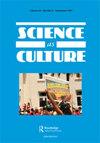性别化数据护理:以数据为中心的生物学中的管理者、护理和计算机
IF 2.4
3区 哲学
Q1 CULTURAL STUDIES
引用次数: 0
摘要
分子数据的增加和计算机技术在生物学中的应用导致了专业生物管理员的出现,他们用高质量的信息填充生物数据库和知识库。尽管生物固化对生命科学知识的生产至关重要,但在很大程度上,它是发生在以数据为中心的生命科学背后的无形劳动。该领域受到缺乏承认和地位的困扰,这与一种服务语言和一个没有能力承认和奖励新型科学实践的科学体系有关。然而,由于大多数生物馆长都是受过高等教育的女性生物学家,生物馆长也再现了女性离开科学终身职位的问题模式,转而选择不那么有声望的职位。与其将这个问题仅仅视为“管道泄漏”的另一个例子,生物固化的性别化可以被视为科学、组织和社会中性别结构的相互作用,这使得生物固化的职业对女性科学家有吸引力,同时将该活动定位为非科学的低地位工作。通过阐明性别在使某些类型的技术科学工作变得不可见的过程中的一些方式,生物固化可以作为现有社会结构如何影响新兴数据中心科学的一个例子。本文章由计算机程序翻译,如有差异,请以英文原文为准。
Gendering data care: curators, care, and computers in data-centric biology
The increase in molecular data and the use of computer technologies in biology have led to the emergence of professional biocurators, who populate biological databases and knowledgebases with high-quality information. Although crucial to life science knowledge production, biocuration is, to a large extent, invisible labour that takes place behind the scenes of data-centric life science. The field suffers from a lack of recognition and status that has been linked to a language of service and a scientific system that is not equipped to recognise and reward new types of scientific practices. However, as the majority of biocurators are highly educated female biologists, biocuration is also reproducing the problematic pattern of women leaving the scientific tenure track in favour of less prestigious positions. Instead of viewing the issue as just another example of ‘the leaky pipeline,’ the gendering of biocuration could be seen as an interplay of gendered structures in science, organisations and society which makes a career in biocuration attractive for female scientists while at the same time positioning the activity as non-scientific low-status work. By illuminating some of the ways gender works in the processes which render certain kinds of technoscientific work invisible, biocuration serves as an example of how existing social structures influence the emerging data-centric science.
求助全文
通过发布文献求助,成功后即可免费获取论文全文。
去求助
来源期刊

Science As Culture
Multiple-
CiteScore
5.20
自引率
3.80%
发文量
28
期刊介绍:
Our culture is a scientific one, defining what is natural and what is rational. Its values can be seen in what are sought out as facts and made as artefacts, what are designed as processes and products, and what are forged as weapons and filmed as wonders. In our daily experience, power is exercised through expertise, e.g. in science, technology and medicine. Science as Culture explores how all these shape the values which contend for influence over the wider society. Science mediates our cultural experience. It increasingly defines what it is to be a person, through genetics, medicine and information technology. Its values get embodied and naturalized in concepts, techniques, research priorities, gadgets and advertising. Many films, artworks and novels express popular concerns about these developments. In a society where icons of progress are drawn from science, technology and medicine, they are either celebrated or demonised. Often their progress is feared as ’unnatural’, while their critics are labelled ’irrational’. Public concerns are rebuffed by ostensibly value-neutral experts and positivist polemics. Yet the culture of science is open to study like any other culture. Cultural studies analyses the role of expertise throughout society. Many journals address the history, philosophy and social studies of science, its popularisation, and the public understanding of society.
 求助内容:
求助内容: 应助结果提醒方式:
应助结果提醒方式:


